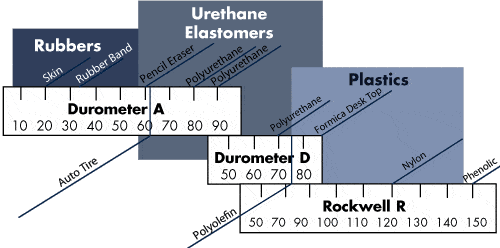Polyurethane
RWM – Pioneers in the field of Urethane Wheels
RWM always strives to offer its customers the absolute best in material quality because we understand that there is no benefit to anyone by using sub-par materials. Having to replace a poor quality part always costs more than purchasing the quality one in the first place.
RWM Casters has always been known as the leader in new product development and has put its extensive experience and engineering capabilities to work towards sourcing, testing and producing wheels using the best possible material.
PPG vs. PTMEG
There are two primary types of polyurethane. They are known as PPG and PTMEG. While the rest of the world uses PPG compounds because they are cheaper, RWM knows that a superior wheel is produced using the PTMEG material.
The following are the properties that are used to compare different polyurethanes:
- Tensile Strength – A general accounting of the strength of the material
- 100% Modulus – The force required to stretch the material to twice its original length
- 300% Modulus – The force required to stretch the material to 300% of its original length
- Elongation at Break – The amount you can stretch the material before it breaks
- Die C Tear and Split Tear – These properties are measures of the material’s resistance to tearing. Two different test methods are used to obtain this information.
- Compression Set – This value measures the material’s resistance to permanent deformation.
- Bashore Rebound – This how well the material absorbs a shock such as a bump in the ground.
RWM Casters Improved Urethane Properties
Between the PPG material used by other companies and the PTMEG material used by RWM, it is plain to see that the PTMEG material is the superior of the two types thus giving you a superior product for your application. Below is a table comparing two type-representative materials.
| Urethane Properties | ||
|---|---|---|
| Property | PPG | RWM PTMEG |
| Tensile Strength (PSI) | 4510 | 7500 |
| 100% Modulus (PSI) | 1705 | 2200 |
| 300% Modulus (PSI) | 3560 | 5000 |
| Elongation at Break (%) | 335 | 350 |
| Die C Tear (PLI) | 385 | 400 |
| Split Tear (PLI) | 134 | 130 |
| Compression Set (%) | 29 | 32 |
| Bashore Rebound (%) | 37 | 48 |
So What Does This Mean To You?
When you buy from RWM Casters, you can be confident that you are getting a wheel that will last longer, take higher loads, absorb shock better, resist abrasion and tearing, will not flat spot and simply provides a better value to the customer.
RWM’s Urethane Wheel Line
- Urethane on Polypropylene Wheels
- Urethane Solid Wheels
- Urethane on Aluminum Wheels
- TorusWheel™ Urethane on Aluminum Round Tread
- Urethane on Iron Wheels
- Omega Wheels
- Whisper Wheels HD Urethane on Iron
- Solid Urethane Wheels
- Ultra Thick Urethane Wheels
Wheel Hardness Comparison Chart
| Wheel Type | Tread Material | Durometer | Scale |
|---|---|---|---|
| SR | Soft Tread Rubber | 70 – 80 | A |
| HR | Hard Tread Rubber | 75 – 85 | D |
| DU | Phenolics | 145 – 150 | R |
| UI, UT, UO, UW, UP, UA, INF | Polyurethane | 90-95 | A |
| UI, UT, UW | 80 A Polyurethane | 80-85 | A |
| UI, UT, UW, SU, MU | 70D Polyurethane | 70-75 | D |
| RI, RA, SW | Rubber | 70-80 | A |
| RP | Gray Rubber | 70-80 | A |
| PO | Polyolefin, Polypropylene | 55-75 | D |
| SW | EHT Rubber | 65-70 | A |
| FN | Pneumatic | 60-65 | A |

